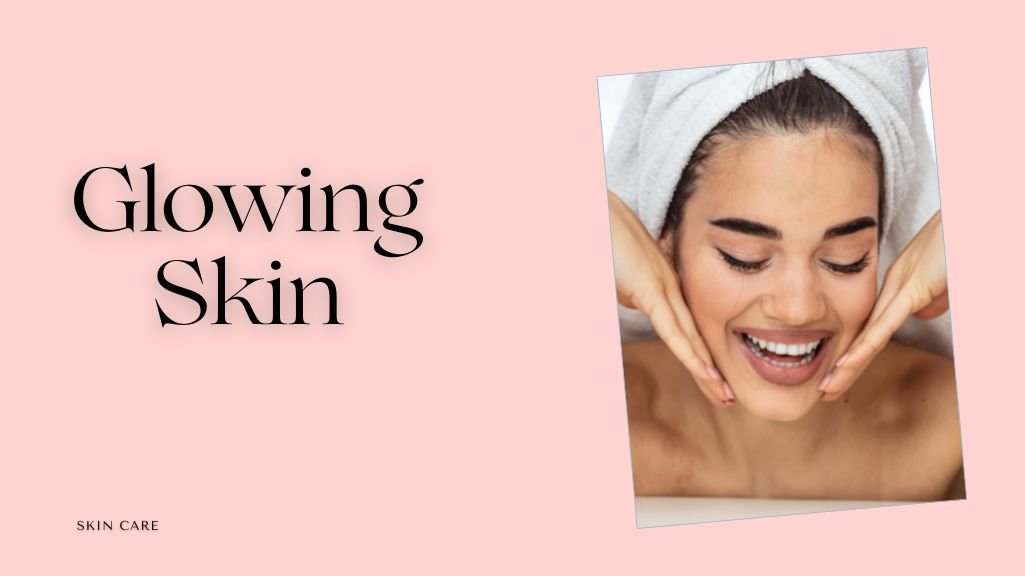How to Get Glowing Skin: Including Advice on Diet, Skin Care
Swati Mandana
. 2 min read
People have varying interpretations of what "glowing skin" means. Many people use the term to describe skin that appears healthy, radiant, and awake. Some individuals achieve a natural sheen or glow due to their healthy skin. Achieving and maintaining healthy skin is within reach for most people with consistent care and attention, aided by apps that provide skincare tips, routines, and tracking progress.

In Most Cases, healthy skin will Exhibit these Characteristics
It is essential to keep in mind that having healthy skin does not equate to having perfect skin. It is impossible to achieve flawless skin. It is possible for the skin to be glowing and healthy while also retaining its normal characteristics, such as:
Use Aloe Vera to keep skin strong and healthy
Aloevera has the ability to heal wounds and may also promote the growth of new cells. It also calms the skin without causing pores to become clogged. If you want your skin to look radiant, try applying aloe vera after you've washed your face every day.
After cleansing your face, be sure to apply moisturizer as directed
You can promote a glowing, youthful appearance by moisturizing your skin with products that have the ability to lock in moisture and also contain antioxidants. You should avoid exfoliating your skin when it feels dry, and you shouldn't skip moisturizing just because your face feels oily.
Coconut Oil
This remedy is most effective when applied to skin that is dry and lackluster. The use of coconut oil not only helps the skin retain its natural moisture but also provides it with the essential fatty acids it needs. In addition to this, it shields your skin from ultraviolet radiation. Your skin may become more radiant as a result of all of these factors.
Turmeric
Curcumin, which is found in turmeric, is an ingredient that possesses powerful antioxidant and anti-inflammatory properties. It rids the skin of the dangerous free radicals that are responsible for the damage they are causing.
Moisturize skin regularly
It is not sufficient to apply moisturizer only occasionally or whenever the skin feels dry. According to dermatologist Jeanine Downie, M.D., who practices at Image Dermatology in Montclair, New Jersey, "Lack of hydration causes your complexion to appear dull and even accentuates wrinkles."
Keep your skin hydrated
Because water makes up approximately 60 percent of our bodies, maintaining proper hydration is critical for optimal bodily function. The fact that you perspire in the summer and feel cold in the winter is a direct result of how our skin reacts and acts in response to changes in temperature.
Take care of your digestive system
According to research, underlying problems in the digestive tract can show up on the skin in a variety of ways, ranging from blemishes to flushing. Overall gut health is nuanced and complex, and it is essential (for so, so many reasons) for everyone to take the time to learn how to care for and nourish their own individual gut flora in order to achieve optimal health.
Yoghurt
Lactic acid, which is found in abundance in yogurt, is beneficial to the health of our skin. Yogurt has a moisturizing effect on our skin, which helps to reduce the appearance of wrinkles and fine lines. It helps reduce tan as well as dark circles under the eyes. It makes the skin more elastic and maintains its healthy glow.
Always Make Sure You Get Enough Water to Drink
You must already be aware of the fact that water makes up more than 70 percent of a human body. It is essential to get enough water every day in order to keep all of your bodily functions working properly, including regulating your weight and energy levels, eliminating toxins from your system, and ensuring that your skin stays healthy.
More Stories from
Unveiling the Top Healthcare Careers: Roles, Qualifications, and Rewards
This article emphasizes the fulfilling nature of healthcare careers and highlights the importance of continuing education in the field.
Cardiac Experts: Best Advice for Maintaining a Healthy Heart
This article emphasizes the importance of taking care of your heart and provides practical tips to reduce your risk of developing heart diseases.
Advancements in Medical Technology: Improving Healthcare Access
Embrace the future of healthcare with these advancements, fostering a more inclusive and accessible healthcare system for all.
Cognitive Enhancers: The Ethics and Implications of Brain-Boosting Drugs
Explore the ethics and implications of cognitive enhancers, also known as "smart drugs," that promise improved cognitive abilities.
The Versatile Guava: A Fruit with a Multitude of Uses
From its delightful taste in culinary creations to its potent health benefits and skincare properties, guava has become a beloved fruit worldwide.











.png?width=40&aspect_ratio=1:1)
